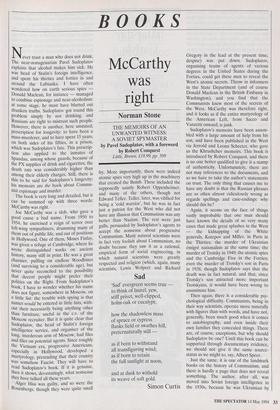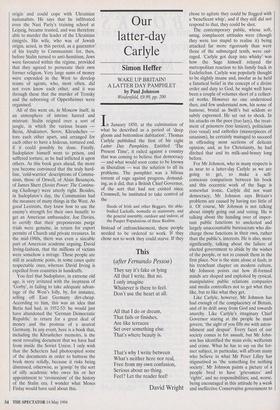BOOKS
Never trust a man who does not drink. The near-nonagenarian Pavel Sudoplatov explains that alcohol makes him sick. He was head of Stalin's foreign intelligence, and spent his thirties and forties in and around the Lubianka. I have often wondered how on earth serious spies Donald Maclean, for instance — managed to combine espionage and near-alcoholism: at some stage, he must have blurted out drunken truths. Sudoplatov got round this problem simply by not drinking, and Russians are right to mistrust such people. However, there is another, here unstated, prescription for longevity: to have been a mass-murderer, and to have spent 15 years, on both sides of his fifties, in a prison. which was Sudoplatov's fate. This prescrip- tion also applied to the inmates of Spandau, among whose guards, because of the PX supplies of drink and cigarettes, the death rate was considerably higher than among their elderly charges. Still, there is this to be said for Sudoplatov's longevity: his memoirs are the book about Commu- nist espionage and murder.
The book is very long and detailed, but it can be summed up with three words: McCarthy was right.
Joe McCarthy was a slob, who gave a good cause a bad name. From 1950 to 1954, he exercised a reign of terror over left-wing sympathisers, drumming many of them out of public life, and out of positions in Hollywood. One of them, Moses Finlay, was given a refuge at Cambridge, where he wrote distinguished works on ancient history, many still in print. He was a great charmer, puffing on endless Woodbines (and surviving to a considerable age), but never quite reconciled to the possibility that decent people might prefer their politics on the Right. From Sudoplatov's book, I have to wonder whether his name does not figure, somewhere in Moscow, on a little list: the trouble with spying is that names would be entered in little lists, with- out their necessarily being anything other than furniture, useful in the c.v. of the Moscow recruiter. But it is quite clear that Sudoplatov, the head of Stalin's foreign intelligence service, and organiser of the long, murderous arm of Moscow, had files and files on potential agents. Since roughly the Vietnam era, progressive Americans, especially in Hollywood, developed a martyrology, pretending that their country was somehow Fascist. They will have to read Sudoplatov's book. If it is genuine, then it shows, devastatingly, what nonsense they have talked all these years.
Alger Hiss was guilty, and so were the Rosenbergs, though they were quite small
McCarthy was right
Norman Stone
THE MEMOIRS OF AN UNWANTED WITNESS: A SOVIET SPYMASTER by Pavel Sudoplatov, with a foreword by Robert Conquest Little, Brown, £18.99, pp. 509
fry. More importantly, there were indeed atomic spies very high up in the machinery that created the Bomb. These included the supposedly saintly Robert Oppenheimer, and many of the others, though not Edward Teller. Teller, later, was vilified for being a 'cold warrior', but he was in fact just a patriot for the West who did not have any illusion that Communism was any better than Nazism. The rest were just gulls, persuaded by Sudoplatov's agents to accept the nonsense about progressive Communism. Many natural scientists were in fact very foolish about Communism, no doubt because they saw it as a rational, empirical form of social engineering, in which natural scientists were greatly respected and religion (which, again, many scientists, Lewis Wolpert and Richard Gregory in the lead at the present time, despise) was put down. Sudoplatov, organising teams of agents of various degrees in the United States during the Forties, could get these men to reveal the West's atomic secrets. Throw in informers in the State Department (and of course Donald Maclean in the British Embassy in Washington), and you find that the Communists knew most of the secrets of the West. McCarthy was therefore right, and it looks as if the entire martyrology of the American Left, from Sacco and Vanzetti onward, is junk.
Sudoplatov's memoirs have been assem- bled with a large amount of help from his son, and have been published in the West via Jerrold and Leona Schecter, who gave us the Khrushchev memoirs. This book is introduced by Robert Conquest, and there is no one better qualified to give it a stamp of authenticity. Unfortunately, there are not may references to the documents, and so we have to take the author's statements on trust. The only thing that causes me to have any doubt is that the Russian phrases are so often almost ridiculously wrong as regards spellings and case-endings: why should this be?
Again, it seems on the face of things vastly improbable that one man should have known the details of so very many cases that made great splashes in the West — the kidnapping of the White generals, Kutepov and Miller, in Paris in the Thirties; the murder of Ukrainian émigré nationalists at the same time; the murder of Trotsky in 1940; the atomic spies and the Cambridge Five in the Forties; even the murder of Trotsky's son in Paris in 1938, though Sudoplatov says that the death was in fact natural, and that, since Trotsky's son attracted more important Trotskyists, it would have been wrong to assassinate him.
Then again, there is a considerable psy- chological difficulty. Communists, being in their way scientists, operate more naturally with figures than with words, and have not, generally, been much good when it comes to autobiography, and even inside their own families they concealed things. There are, of course, exceptions, but why should Sudoplatov be one? Until this book can be supported through documentary evidence, we should not give it the same source- status as we might to, say, Albert Speer. Just the same, it is one of the landmark books on the history of Communism, and there is hardly a page that does not reveal something. The author, after all, was moved into Soviet foreign intelligence in the 1930s, because he was Ukrainian by origin and could cope with Ukrainian nationalists. He says that he infiltrated even the Nazi Party's training school at Leipzig, became trusted, and was therefore able to murder the leader of the Ukrainian emigres. His wife, who was of Jewish origin, acted, in this period, as a guarantor' of his loyalty to Communism: for, then, before Stalin turned to anti-Semitism, Jews were favoured within the regime, provided that they agreed to persecute their own former religion. Very large sums of money were expended in the West to develop teams of agents, who, most often, did not even know each other, and it was through these that the murder of Trotsky and the suborning of Oppenheimer were organised.
All of this went on, in Moscow itself, in an atmosphere of intense hatred and mistrust: Stalin reigned over a sort of jungle, in which the various beasts Beria, Abakumov, Serov, Khrushchev tore each other apart, and arranged for each other to have a hideous, tortured end, if it could possibly be done. Finally, Sudoplatov himself went to prison, and suffered torture, as he had inflicted it upon others. As this book goes ahead, the more you become convinced that the truly hard- line, 'cold-warrior' descriptions of Commu- nism, those of Orwell, of Alain Besancon, of James Sherr (Soviet Power:• The Continu- ing Challenge) were utterly right. Besides, in Sudoplatov's day, the Communists had the measure of many things in the West. As good Leninists, they knew how to use the enemy's strength for their own benefit: to get an American ambassador, Joe Davies, to certify that their preposterous purge trials were genuine, in return for export permits of Church and private treasures. In the mid-1980s, there was even a sizeable part of American academe arguing, David Irving-fashion, that the millions of victims were somehow a mirage. These people are still in academic posts, in some cases quite respectable ones, whereas David Irving is expelled from countries in handcuffs.
You feel that Sudoplatov, in extreme old age, is very irritated with the ineptness of `Gorby', in failing to take adequate advan- tage of the West's folly, by, for instance, selling off East Germany dirt-cheap. According to him, this was an idea that Beria had had, in 1952-53: he would just have abandoned the 'German Democratic Republic' in return for a great deal of money and the promise of a neutral Germany. In any event, here is a book that, including the Khrushchev memoirs, is the most revealing document that we have had from inside the Soviet Union. I only wish that the Schecters had photocopied some of the documents in order to buttress the book more solidly, because it risks being dismissed, otherwise, as 'gossip' by the sort of silly academic who owes his or her appointment to 'revisionism' of the history of the Stalin era. I wonder what Moses Finlay would have said about this.



























































 Previous page
Previous page